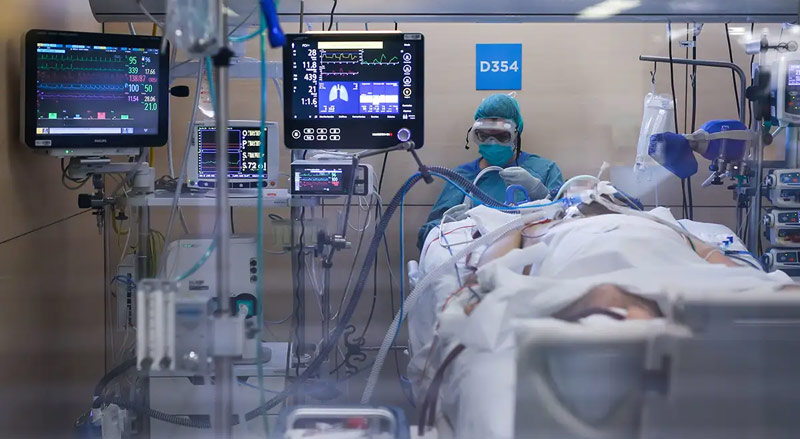A new study has found that COVID-19 mRNA injections are behind so-called “long Covid.”
In a new paper, scientists behind the study reveal that spike protein has been detected in the bloodstream of people suffering from long Covid.
According to the scientists, the spike protein was found up to two months after Covid mRNA vaccination.
The discovery suggests that spike protein may persist in the body much longer than previously predicted and does not remain at the injection site as claimed by pharmaceutical companies and health officials.
The findings also dispute previous claims that long Covid was caused by the virus as it now appears to be a reaction to the mRNA injections.
The study was published on December 27 in the renowned European Review for Medical and Pharmacological Sciences.
The scientists found vaccine spike protein in two patients at least two months after receiving their second dose of a COVID-19 vaccine.
They also discovered viral spike protein in one subject who previously recovered from infection in a cohort of 81 patients with long Covid syndrome.
Samples gathered from the unvaccinated control group were negative for spike protein.
“This study, in agreement with other published investigations, demonstrates that both natural and vaccine spike protein may still be present in long Covid patients, thus supporting the existence of a possible mechanism that causes the persistence of spike protein in the human body for much longer than predicted by early studies,” the authors wrote.
U.S. regulatory agencies claim vaccinating against COVID-19 can reduce the risk of developing long Covid.
However, research suggests the condition may be caused by an immune overreaction to the spike protein in COVID-19 vaccines used to induce antibodies.
In a February 2023 study published in the Journal of Medical Virology, researchers examined the levels of spike protein and viral RNA circulating in patients hospitalized for COVID-19 with and without long Covid.
They found that spike protein and viral RNA were more likely to be present in patients with long Covid.
In patients with long Covid, 30 percent were positive for both spike protein and viral RNA.
None of the individuals without long Covid were positive for both.
When COVID-19 vaccines were first authorized, the Centers for Disease Control and Prevention (CDC) said the spike protein produced by the body after receiving a COVID-19 vaccine is a “harmless piece of spike protein.”
Furthermore, the agency stated that spike protein didn’t “last long in the body” and breaks down within a few weeks like other proteins.
The Infectious Diseases Society of America, a resource center funded partly through a cooperative agreement with the CDC, estimated that the spike proteins generated by COVID-19 vaccines only last up to a few weeks in the body.
An early Pfizer biodistribution study showed that the Covid spike protein gets into the blood after vaccination.
Once in the bloodstream, it circulates for several days before accumulating in organs and tissues, including the spleen, bone marrow, the liver, adrenal glands, and in high concentrations in the ovaries.
In this study, researchers found vaccine mRNA was present from the day of vaccination and persisted in the bloodstream for weeks after vaccination.
In an August 2023 paper published in Biomedicines, researchers found the design of the Covid mRNA vaccines allows uncontrolled biodistribution, durability, and persistent bioavailability of the spike protein inside the body after vaccination.
This presence of the spike protein could potentially damage tissues and cause disease.
The study group included 20 subjects who received two doses of a Covid mRNA vaccine, 20 who were unvaccinated and tested negative for COVID-19 or antibodies indicating they had previously been infected, and a control group of 20 unvaccinated participants who tested positive for the virus.
Researchers detected specific fragments of spike protein in about 50 percent of subjects who received mRNA vaccines 69 to 187 days following vaccination.
All samples from the unvaccinated control group were negative, including the 20 individuals who had tested positive after contracting COVID-19.
In a January 2023 study published in the Journal of Pathology, Microbiology, and Immunology, researchers found full-length or traces of SARS-CoV-2 spike mRNA in some patient samples up to 28 days after Covid vaccination.
This discovery indicates a prolonged production of spike protein and the potential for a “continuous immune response in some persons.”
A study published in March 2022 in Cell found vaccine mRNA in lymph nodes on days 7, 16, and 37 following vaccination.
Immunohistochemical staining for spike antigen in mRNA-vaccinated patient lipid nanoparticles in some individuals showed spike protein antigen was still present as late as 60 days following the second vaccine dose.
A November 2021 study in The Journal of Immunology found exosomes expressing spike protein 14 days after vaccination with Covid mRNA injections.
Levels of spike protein also increased following booster doses.
The rising levels after boosters suggest the amount of spike protein in the body increases with subsequent injections.
A 2021 study in Clinical Infectious Diseases led by researchers at Brigham and Women’s Hospital and the Harvard Medical School found circulating SARS-CoV-2 proteins in the plasma of participants vaccinated with Moderna’s COVID-19 vaccine.
Spike protein was detected in blood plasma as early as one day following the first vaccine dose.
READ MORE: Bill Gates Insider Warns of Massive Population Plunge in ‘Highly Vaccinated Countries’



